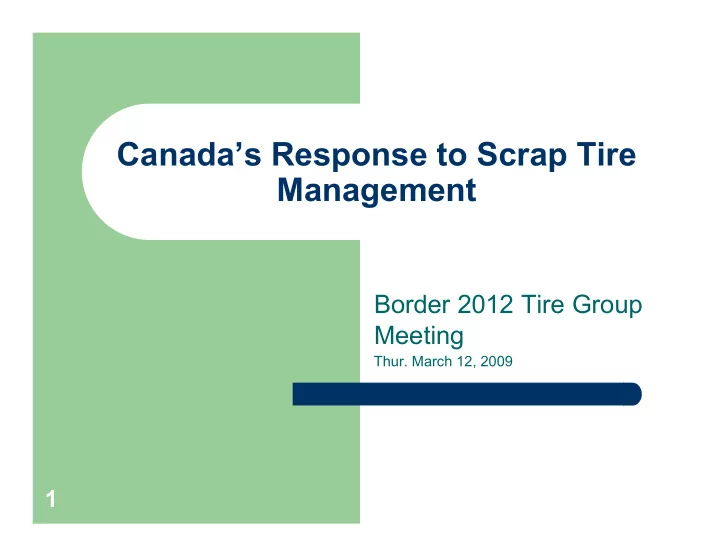

Canada’s Response to Scrap Tire Management Border 2012 Tire Group Meeting Thur. March 12, 2009 1
Agenda Profile of Canada Scrap Tire Management in Canada – Impetus for a Tire Program – Describe Different Models – Key Elements for Success 2
Canada 33 Million People 33 M tires Ten provinces, three territories Scrap tires are a provincial jurisdiction All provinces introduced tire programs in the 1990’s 3
Hagersville Tire Fire Feb 1990 Tire Fire in Ontario 14 Million Tires burned for 17 days A wake-up call to all provinces to create a tire program 4
2 Types of Tire Programs in Canada Government – Run – Ministry of Environment – Crown Corporation Industry Stewardship – Shared Responsibility ie. tire retailers & manuf. – Extended Producer Responsibility ie. Brand Owners and 1 st Importers (Ontario 2009) 5
Common Program Elements Eco fee based on the retail sale of a new tire ($3-5/tire) The eco fee is sent from the retailer to the Agency (Gov’t. or Industry), which uses all the monies to: – Pay the tire hauler for the collection of retailer’s scrap tires once he delivers to processor (helps to eliminate illegal dumping) – Pay the tire processor a fee to cover two things: The processor’s ‘tip fee’ (help reduces illegal dumping) A processing incentive to produce higher value products Public Education // Promotion of Recycled Products R&D Funding // Stockpile Abatement Track scrap tire collection from retailer to hauler to processor Agency is Responsible and Accountable 6
Key Elements of the Funding Model The fee must be high enough All the monies collected go to scrap tire management Retailer receives free scrap tire pick-up Hauler must not be paid until tires delivered to registered processor (eliminates illegal dumping) Processor is only paid when he sells product into the marketplace (to discourage stockpiling tires or finished goods) Program must not be voluntary. It must be a Regulatory initiative to: Identify the obligated steward ie tire retailer, brand owner, first importer, tire – manufacturer etc. Allow Stewards to create an Agency to develop their program and make – them responsible and accountable 7
Industry Funding Organization The IFO (Industry Funding Organization) is a not-for-profit agency created by the obligated stewards to write, implement and manage the stewardship program. The IFO board of directors will be comprised of key tire stakeholders ie. retailers/dealers, manufacturers, OEMs Generally speaking, other affected stakeholders such as processors, haulers, environmentalists, municipalities etc will be part of an Advisory Committee to the Board, but not on the Board. 8
Questions? 9
Recommend
More recommend